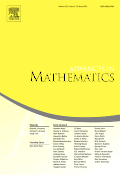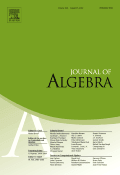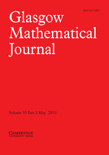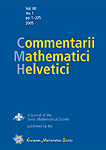
Advances in Group Theory and Applications
Scope & Guideline
Unlocking Innovations in Algebra and Number Theory
Introduction
Aims and Scopes
- Group Theory Fundamentals:
The journal publishes research that explores the fundamental properties and structures of groups, including subgroup characteristics, group actions, and automorphisms. - Algebraic Structures and Their Applications:
Research on various algebraic structures such as algebras, rings, and modules is a core focus, particularly their interrelations with group theory. - Character Theory and Representations:
The exploration of character theory and modular representations is emphasized, with studies addressing finite groups and their representations over different fields. - Geometric Group Theory:
The journal includes investigations into geometric aspects of groups, particularly how group structures can be understood through geometric representations. - Computational Group Theory:
There is a growing emphasis on computational approaches in group theory, including algorithms for group computations and their applications in other fields.
Trending and Emerging
- Applications of Group Theory to Algebraic Structures:
Recent papers have increasingly explored the applications of group theory to various algebraic structures, highlighting the interplay between these fields and their relevance to problems in mathematics and physics. - Computational Methods in Group Theory:
There is a growing trend in utilizing computational approaches to solve problems in group theory, including the development of new algorithms and software tools for group analysis. - Interdisciplinary Connections:
Emerging research is highlighting the connections between group theory and other disciplines, such as topology, combinatorics, and even computer science, indicating a trend towards interdisciplinary applications. - Character Theory and Modular Representation:
An increasing number of articles focus on advanced topics in character theory and modular representation, reflecting a deeper investigation into these areas and their implications for finite groups. - Geometric and Topological Aspects of Groups:
Studies examining the geometric and topological properties of groups have gained traction, showcasing the relevance of geometric group theory in contemporary research.
Declining or Waning
- Classical Results in Group Theory:
While classical results have historically been a staple of group theory research, there has been a noticeable decrease in papers focusing solely on these foundational results, as the field shifts towards more applied and computational approaches. - Finite Group Classification:
Research specifically focused on the classification of finite groups appears to be less prevalent, with fewer studies exploring this area compared to previous years. - Elementary Group Theory:
Elementary topics in group theory, such as basic group properties and simple examples, have seen a decline as the journal's focus has shifted towards more complex and nuanced aspects of the field.
Similar Journals

ADVANCES IN MATHEMATICS
Elevating Mathematical Excellence Since 1961ADVANCES IN MATHEMATICS, published by Academic Press Inc. Elsevier Science, is a premier journal in the field of mathematics, with its ISSN 0001-8708 and E-ISSN 1090-2082. Renowned for its rigorous peer-reviewed research, this journal serves as a platform for disseminating cutting-edge advancements and innovative approaches across all branches of mathematics. With an impressive Q1 category ranking in Mathematics (miscellaneous) and a Scopus rank of 74/399 placing it in the 81st percentile, it is considered a vital resource for researchers and professionals seeking to stay abreast of emerging trends and developments. Although it is not currently an open access publication, ADVANCES IN MATHEMATICS remains committed to publishing high-quality articles that elevate the field and foster scholarly communication. Established in 1961 and continuously influential in advancing mathematical sciences, this journal is crucial for anyone deeply engaged in mathematical research.

JOURNAL OF ALGEBRA
Fostering Excellence in Algebraic ResearchThe JOURNAL OF ALGEBRA, published by Academic Press Inc. Elsevier Science, is a premier scholarly outlet dedicated to the field of algebra and number theory. With its impressive Q1 ranking in the 2023 category of Algebra and Number Theory and a solid Scopus rank of #46 out of 119, it stands as a crucial resource for researchers and professionals seeking to deepen their understanding of advanced algebraic concepts. Operating since 1964 and continuing through 2025, the journal boasts a rich history of publishing influential research that drives the discipline forward. While the journal does not currently offer open access options, it remains committed to providing high-quality peer-reviewed content to the academic community. Its comprehensive archive and cutting-edge research articles serve as essential tools for students, researchers, and practitioners aiming to stay at the forefront of algebraic studies.

Documenta Mathematica
Advancing Mathematical Knowledge for AllDocumenta Mathematica is a premier academic journal published by the European Mathematical Society (EMS), making significant contributions to the field of mathematics since its inception. With an Open Access model established in 1996, the journal ensures that scholarly works are freely available to a global audience, promoting widespread dissemination of mathematical research. Based in Germany, it serves as a vital platform for mathematicians, covering a wide array of topics within the discipline, evidenced by its impressive Q1 ranking in the miscellaneous category of mathematics as of 2023. Featuring rigorous peer-reviewed articles that span the latest trends and breakthroughs in the discipline, Documenta Mathematica also retains a commendable position among its peers with a Scopus rank of 163 out of 399, placing it in the 59th percentile for general mathematics. Researchers, professionals, and students alike will benefit from the robust scholarly content and the journal's commitment to advancing mathematical knowledge.

TRANSACTIONS OF THE AMERICAN MATHEMATICAL SOCIETY
Advancing Mathematical Frontiers Since 1900TRANSACTIONS OF THE AMERICAN MATHEMATICAL SOCIETY, published by the American Mathematical Society, is a premier journal in the field of mathematics that has been contributing to the advancement of mathematical knowledge since 1900. With an ISSN of 0002-9947 and an E-ISSN of 1088-6850, this journal holds a prestigious position in the academic landscape, evidenced by its Q1 rankings in both Applied Mathematics and Miscellaneous Mathematics categories as of 2023. With a Scopus ranking of #97 in General Mathematics and a percentile standing of 75th, the journal is recognized for its rigorous peer-review process and the quality of the research it publishes. Though it does not currently offer open access options, it essentially serves as a vital resource for researchers, professionals, and students seeking critical insights and developments in mathematical theory and applications. The Transactions aim to publish high-quality research articles that foster the exchange and dissemination of ideas, supporting the growth of both theoretical and applied mathematics within the global scholarly community.

GLASGOW MATHEMATICAL JOURNAL
Empowering scholars with cutting-edge mathematical knowledge.GLASGOW MATHEMATICAL JOURNAL is a prestigious academic publication in the field of mathematics, published by Cambridge University Press since its inception in 1967. This journal, with an ISSN of 0017-0895 and an E-ISSN of 1469-509X, provides a platform for innovative and high-quality research articles, fostering the advancement of mathematical sciences globally. Covering a broad scope, including various subfields, the journal has been recognized in the top quartile (Q2) of the Mathematics (miscellaneous) category according to 2023 rankings, solidifying its importance and credibility within the academic community. The journal is committed to disseminating rigorous research, making it an invaluable resource for researchers, professionals, and students alike, who are keen to stay abreast of the latest developments in the mathematical landscape. By choosing the GLASGOW MATHEMATICAL JOURNAL, authors ensure their work reaches a discerning audience, while readers gain access to cutting-edge theoretical and applied mathematical insights.

International Electronic Journal of Algebra
Exploring the Depths of Algebra and Number TheoryThe International Electronic Journal of Algebra (IEJA) is a premier open-access platform dedicated to advancing research in the field of algebra and number theory. Established in Turkey and published by IEJA-INT ELECTRONIC JOURNAL ALGEBRA, this journal has been providing unrestricted access to high-quality scholarly articles since 2007, facilitating the dissemination of valuable findings and innovative methodologies to a global audience. With an ISSN of 1306-6048 and a notable Scopus rank of 85 out of 119 in its category, IEJA contributes significantly to the mathematical community, evidenced by its Q3 quartile ranking in Algebra and Number Theory as of 2023. Researchers, professionals, and students can engage with a diverse range of topics in algebra, enhancing both theoretical understanding and practical applications in this vital area of mathematics. As a journal committed to fostering collaboration and progress, IEJA stands out as an essential resource for anyone seeking to contribute to and learn from the evolving discourse in algebra.

New York Journal of Mathematics
Advancing mathematical frontiers for a global audience.New York Journal of Mathematics is a prominent open-access journal, published by the ELECTRONIC JOURNALS PROJECT, dedicated to advancing the field of mathematics through the dissemination of groundbreaking research. Since its inception in 1996, the journal has evolved into a valuable resource for researchers, educators, and students, particularly in the realm of general mathematics. As of 2023, it proudly holds a Q2 classification in the Mathematics (miscellaneous) category, reflecting its growing impact and reach within the academic community, despite being ranked at the 31st percentile overall. With its commitment to open access since 2022, the journal ensures that high-quality mathematical research is readily available to a global audience, fostering collaboration and innovation. Researchers interested in contributing to this dynamic field will find the journal a vital platform for sharing their findings and engaging with fellow mathematicians around the world.

COMMENTARII MATHEMATICI HELVETICI
Advancing Mathematical Frontiers with Open Access InsightsCOMMENTARII MATHEMATICI HELVETICI, published by the EUROPEAN MATHEMATICAL SOCIETY, is a premier open-access journal in the field of mathematics, specifically categorized within the Q1 quartile of miscellaneous mathematics as of 2023. With an ISSN of 0010-2571 and an E-ISSN of 1420-8946, this esteemed journal has a rich history, having commenced its publication journey in 1929 and set to continue until at least 2024. Based in Germany, it provides a valuable platform for original research and significant advancement in mathematical theory and application, appealing to researchers, professionals, and students alike. The journal's commitment to open access since 2022 further enhances its accessibility and outreach, ensuring that cutting-edge mathematical developments are readily available to a global audience. Its Scopus ranking, which places it at the 165th position out of 399 in the general mathematics category (58th percentile), exemplifies its impact and relevance in the academic community.

St Petersburg Mathematical Journal
Advancing Mathematical Frontiers with Every IssueSt Petersburg Mathematical Journal, published by the American Mathematical Society, is a distinguished platform that fosters research and discourse in the fields of mathematics, specifically focusing on Algebra and Number Theory, Analysis, and Applied Mathematics. With an ISSN of 1061-0022 and an E-ISSN of 1547-7371, this journal has been a reliable source of cutting-edge mathematical research since its inception in 2003 and continues to publish high-quality content through 2024. Although not open-access, it offers valuable insights and advances the mathematical community's understanding, as indicated by its respectable impact factor and Scopus rankings across various categories—landing in the Q3 quartile across three significant mathematical disciplines. Researchers, professionals, and students are encouraged to contribute and engage with this journal, as it remains a vital resource for promoting collaboration and discovery within the ever-evolving field of mathematics.

Advances in Mathematics of Communications
Bridging Theory and Application in MathematicsAdvances in Mathematics of Communications, published by the American Institute of Mathematical Sciences (AIMS), is a leading journal dedicated to the dissemination of high-quality research in the fields of algebra, number theory, applied mathematics, discrete mathematics, combinatorics, and computer networks. Established in 2008, this journal has quickly established itself as a significant contributor to mathematical communications, holding a reputable position in the Scopus rankings, with impressive category quartiles, including Q2 rankings in key areas such as Algebra and Number Theory and Applied Mathematics. Besides its rigorous peer-review process, the journal facilitates the growth of innovative ideas and methodologies that bridge the gap between theory and application. With no open access restrictions, Advances in Mathematics of Communications aims to provide an inclusive platform for researchers, professionals, and students to share their findings and insights, fostering collaboration and advancing the global knowledge base in the mathematical sciences. The journal's commitment to excellence ensures its role as an essential resource in the ever-evolving landscape of mathematics.